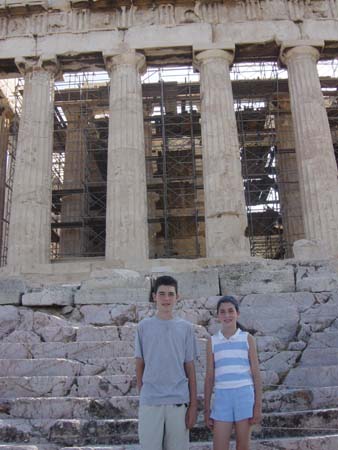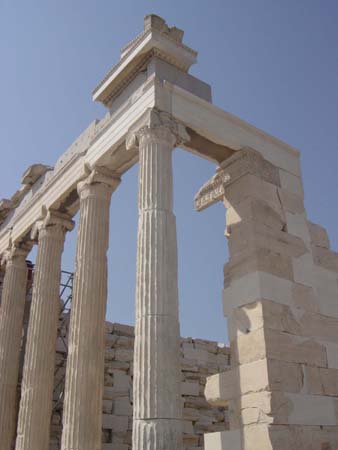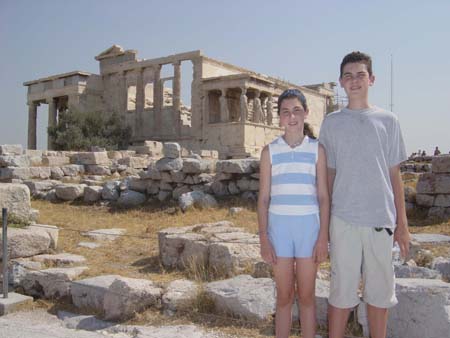DAVID'S DOWNLOADS
August 30 - Ancient Athenian Democracy
Today we visited the Acropolis in Athens and it was amazing. I have been learning about how the ancient Athenian's influenced Western Civilization. The ancient Athenian democracy was the first true foundation for democracy as we know it today. Solon, an Athenian statesman and legislator, is considered the founder of the democracy in Athens. He developed the main ideas of the present democracies, such as public assemblies and a government controlled by the people. When he came to power, he changed the lives of all Athenians and set the stage for democracies to come.
Solon was elected to take the government into his own hands during a time
of hardship for Athenians (594 B.C). An agricultural depression was sending
small farmers into slavery, and many political parties were threatening to
take power. He immediately cancelled all debts and mortgages. He also encouraged
the debt-stricken farmers to take up new occupations and trades. He then separated
the citizens into four classes, where each class had its own privileges and
duties. He believed that each class should receive privileges in proportion
to the burden it was able to bear. The political offices were given to members
of the first three classes, while the fourth class had the right to take part
in the public assembly. This was the first step to a popular government because
the people had total control over the administration. The public assembly
voted on the laws and policies for the community. Every free man, including
the poor,  could
vote in the public assembly. Women and slaves could not take part in the assembly,
but had a set of privileges and protection laws. When a vote took place, each
man either put a white (yes) or a black (no) pebble into a pot. Today I actually
saw the place where this pot was placed (atop a huge rock near the acropolis)
and where hundreds of men voted on ancient political issues.
could
vote in the public assembly. Women and slaves could not take part in the assembly,
but had a set of privileges and protection laws. When a vote took place, each
man either put a white (yes) or a black (no) pebble into a pot. Today I actually
saw the place where this pot was placed (atop a huge rock near the acropolis)
and where hundreds of men voted on ancient political issues.
The assembly also had the power to ostracize (banish) someone from Athens
who they thought was getting too powerful and might try to take over. After
the assembly was created, a new council was formed to prepare proposals for
the assembly to vote on. This council was made up of four hundred members,
and met regularly to discuss proposals for the assembly. Each class also had
a set of military duties. The first three classes were to provide men for
the land army of Attica, while the fourth class was to provide rowers for
the navy. Athens had such a strong military and navy, because they were fighting
for their freedom and rights, while most of their opponents were forced to
fight and really had no reason to fight at all. Solon's  regulations
and ideas reached into every corner of life from marriage, to adoption, to
clothing and farming. Although it seemed that Solon was a great person and
no one could have disliked him, he was greatly opposed by the people. The
wealthy thought that the government was too democratic, while the poor disagreed
and believed that the government was not democratic enough. This got to be
too much for him, and he left for a period of ten years.
regulations
and ideas reached into every corner of life from marriage, to adoption, to
clothing and farming. Although it seemed that Solon was a great person and
no one could have disliked him, he was greatly opposed by the people. The
wealthy thought that the government was too democratic, while the poor disagreed
and believed that the government was not democratic enough. This got to be
too much for him, and he left for a period of ten years.
Solon's democratic government had many differences from our present form of government. He created a direct democracy, where all citizens could vote and speak in the government. We have a representative democracy, where we vote for people to represent us in the government. Everyone is treated equal in a representative democracy, but in a direct democracy, woman and slaves don't have the same rights as men. By the middle of the twentieth century, almost every independent nation in the world had some form of a democracy, or practiced some of the principles of democracy. We have Solon to thank for that!
